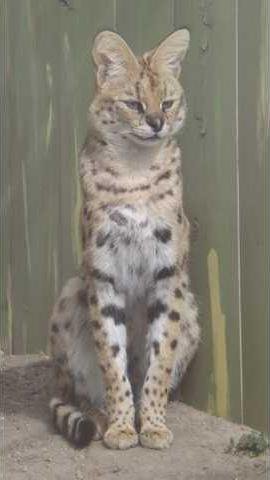The Great Bend Brit Spaugh Zoo has a new female African serval named Sheba. The serval is a speckled wild cat that typically weighs 15-40 pounds and grows to a length of 23-36 inches.
Zoo Supervisor and Curator Sara Hamlin writes, “Sheba is a 5-year-old serval that moved to the zoo in early November. Sheba is a former pet that moved here at the recommendation from the Serval SSP (Species Survival Plan). She had lived in a family home since she was a small cub, but when the family was forced to relocate for a job they found out that they could not legally own her in their new state.” She was surrendered to the U.S. Fish and Wildlife Service.
Sheba spent her first month at the Great Bend zoo in a 30-day quarantine that is mandatory for all new animals. Then zoo staff moved the male serval, Akita, down to quarantine to meet her.
“Due to her unconventional upbringing the introduction process was a very slow one, as Sheba has never been around another serval before,” Hamlin said. “She needed a lot of time to adjust to her new house mate. We also had to be very cautious during their introductions because Sheba had been declawed, leaving her at risk for serious injury if Akita had become too aggressive with her. Fortunately, Akita was a perfect gentleman and gave her the space she needed to adjust to his presence — all the while expressing his interest in getting to know her.
“Last week we decided they had had enough time to get to know each other in the privacy of quarantine and moved them back to their exhibit in the zoo.”
The keepers have been leaving the serval pair with access to their building so that they can be as comfortable as possible while Sheba becomes familiar with her new surroundings. So, while Akita likes to spend a lot of time outside, Sheba is still getting used to her new home. The best time to catch a glimpse of her is in the afternoons, Hamlin said.
“While visiting the servals, guests may notice that Sheba’s gait is a little different than Akita’s and she sometimes walks with a limp. This is due to the declawing procedure that had been done on her feet when she was very young,” Hamlin said. “Declawing of a cat essentially removes the nail and a portion of the bone behind it to ensure that the nail doesn’t grow back. While this is a somewhat common procedure, if it is not done properly it can cause lasting damage to the cat’s feet and over time cause arthritis through the legs. Unfortunately for Sheba hers was not done correctly, which has caused the bones in her feet to shift too far forward. That has changed the way she walks and therefore occasionally causes her pain.
“Keepers monitor her closely and our veterinarians have prescribed daily medication to help with pain management.”
Before she was moved to the exhibit, keepers and maintenance staff made modifications to accommodate Sheba’s special needs. They lowered a platform and added ladders to make climbing easier.
Zoo news: Another African serval arrives





